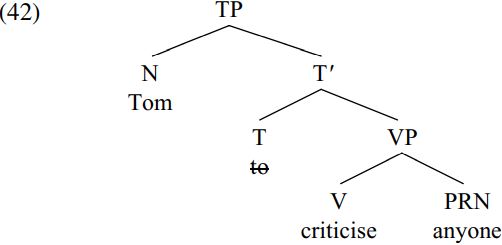
Null T in bare infinitive clauses
 المؤلف:
Andrew Radford
المؤلف:
Andrew Radford
 المصدر:
Minimalist Syntax
المصدر:
Minimalist Syntax
 الجزء والصفحة:
121-4
الجزء والصفحة:
121-4
 12-8-2022
12-8-2022
 2846
2846
Null T in bare infinitive clauses
We have argued that auxiliariless finite clauses are TP constituents headed by an abstract T containing a tense affix. Given that clauses containing a finite auxiliary are also TPs, a plausible conclusion to draw is that all finite clauses are TPs. Since to infinitive clauses are also TPs (with to serving as a non-finite tense particle) we can generalize still further and say that all finite and infinitival clauses are TPs. This in turn has implications for how we analyze bare (i.e. to-less) infinitive complement clauses such as those bracketed below (where the italicized verb is infinitival in form):

If (as we are suggesting) all finite and infinitival clauses are indeed TPs, bare infinitive clauses like those bracketed in (41) will be TPs headed by a null T constituent. Since the relevant null T constituent resembles infinitival to in requiring the (italicized) verb in the bracketed complement clause to be in the infinitive form, we can take it to be a null counterpart of infinitival to (below symbolized as  ). This in turn will mean that the bracketed infinitive clause in (41a) has the structure (42) below:
). This in turn will mean that the bracketed infinitive clause in (41a) has the structure (42) below:

We could then say that verbs like know, see and let (as used in (41) above) take an infinitival TP complement headed by an infinitive particle with a null spellout, whereas verbs like expect, judge, report, believe etc. take a TP complement headed by an infinitive particle which is overtly spelled out as to in structures like those below:

This means that all infinitive clauses are TPs headed by an infinitival T which is overtly spelled out as to in infinitive clauses like those bracketed in (43), but which has a null spellout in infinitive clauses like those bracketed in (41).
From a historical perspective, the null infinitive particle analysis is far from implausible since many bare infinitive clauses in present-day English had to infinitive counterparts in earlier varieties of English – as is illustrated by the following Shakespearean examples:
 Moreover, some bare infinitive clauses have to infinitive counterparts in present-day English:
Moreover, some bare infinitive clauses have to infinitive counterparts in present-day English:

The infinitive particle which heads the bracketed infinitival TP in sentences like (45) and (46) must be overtly spelled out as to when the relevant TP is used as the complement of a passive participle like known in (45b) or seen in (46b), but can have a null spellout when the relevant TP is the complement of an active transitive verb like the perfect participle known in (45a) or the past-tense form saw in (46a) – a key difference being that a null spellout for the infinitive particle is optional in structures like (45a) but obligatory in structures like (46a). Although data like (44)–(46) are suggestive rather than conclusive, they make it plausible to suppose that bare infinitive clauses are TPs headed by a null variant of infinitival to.
Additional support for the null infinitive particle analysis of bare infinitive clauses comes from cliticisation facts in relation to sentences such as the following:

If we suppose that the bracketed infinitive complement in (47b) is a TP headed by a null variant of infinitival to as in:

we can account for the fact that have cannot cliticise onto you by positing that the presence of the null infinitive particle  intervening between you and have blocks cliticisation of have onto you.
intervening between you and have blocks cliticisation of have onto you.
A further argument leading to the same conclusion comes from structures like:

It has been argued by Safir (1993) that the pronoun there (in this use as an expletive pronoun) is restricted to occurring in the specifier/subject position within TP. Such a restriction would account for contrasts such as:

since the first bracketed complement is a TP headed by infinitival to, and the second is a type of verbless clause sometimes referred to as a small clause which appears not to be headed by T (since it contains no auxiliary or infinitival to, and no VP). If expletive there can only occur in spec-TP, it follows that the bracketed infinitive complement clauses in (49) must be TPs headed by a null infinitival T.
Our discussion here leads us to the wider conclusion that both to infinitive clauses and bare (to-less) infinitive clauses are TP constituents headed by an infinitive particle which has the overt spellout to in most types of infinitive clause, but has a null spellout in bare infinitive clauses. Given that we earlier argued that all finite clauses contain a TP projection (headed by a T which contains a tense affix, and may or may not also contain an auxiliary), the overall conclusion which we reach is that all finite and infinitival clauses contain a TP, and that T is overt in clauses containing a finite auxiliary or infinitival to, but is null elsewhere (because to in bare infinitive clauses has a null spellout, and the Tns affix in auxiliariless finite clauses is lowered onto the main verb in the PF component). One advantage of this analysis is that it enables us to attain a uniform characterization of the syntax of (finite and infinitival) clauses as TP structures headed by a T with a V or VP complement. (For alternative analyses of the types of structure discussed here, see Felser 1999a,b and Basilico 2003.)
 الاكثر قراءة في Syntax
الاكثر قراءة في Syntax
 اخر الاخبار
اخر الاخبار
اخبار العتبة العباسية المقدسة


